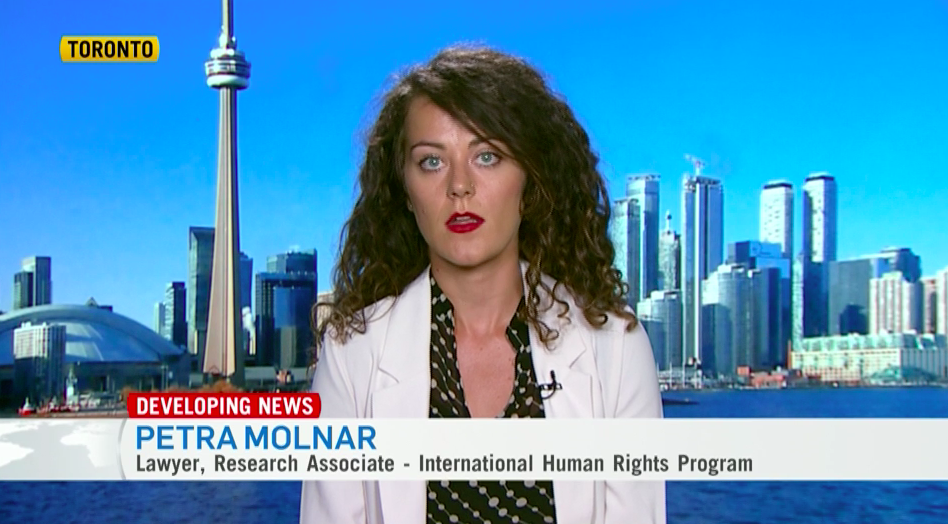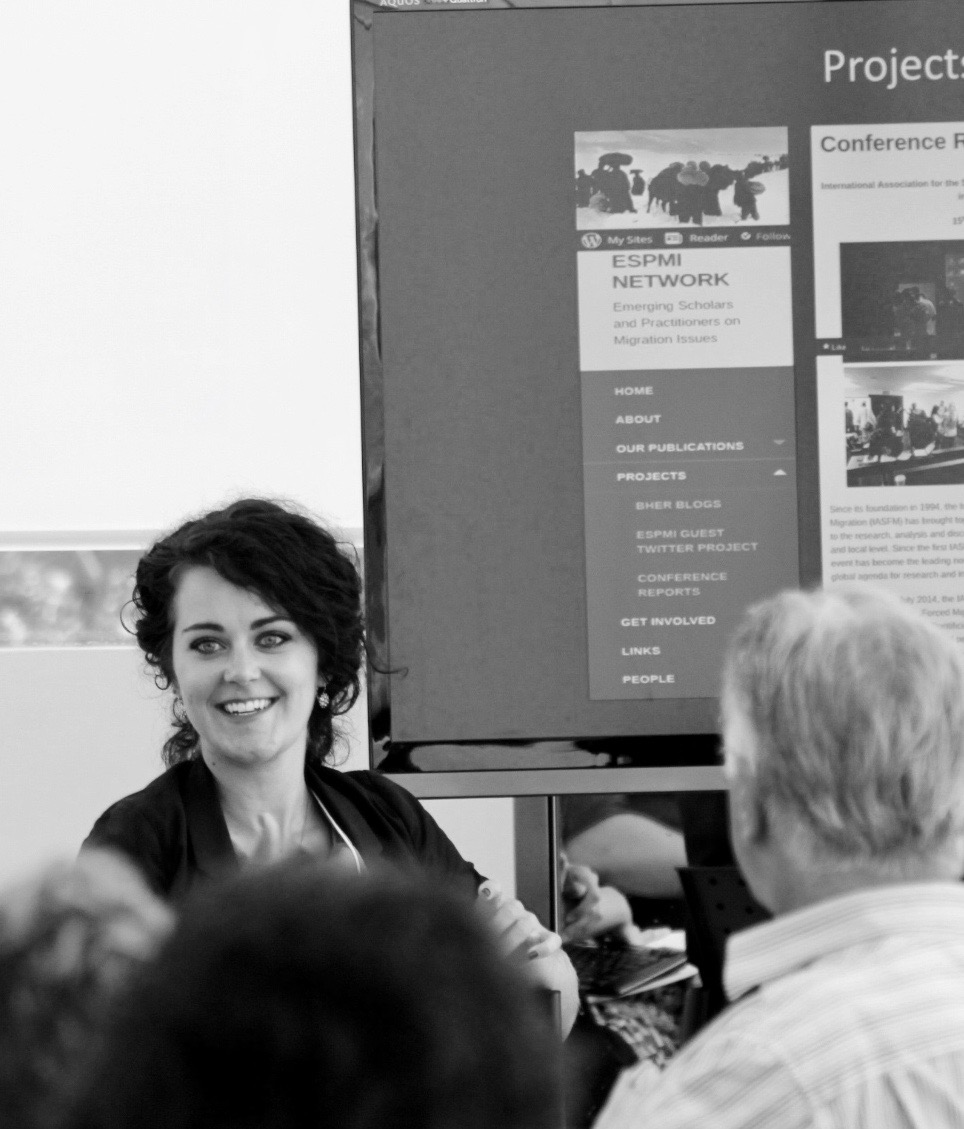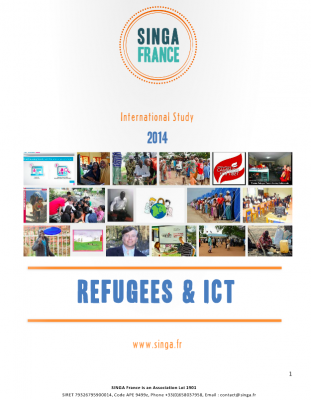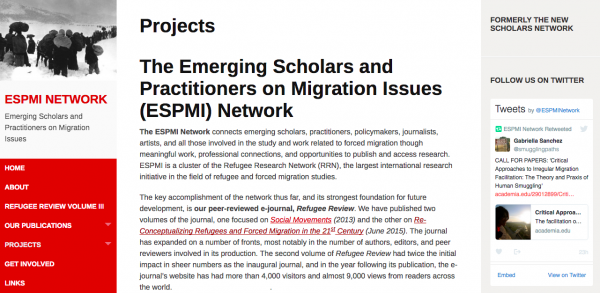
Petra Molnar
Associate Director, Refugee Law Lab, York University & Faculty Associate, Berkman Klein Center for Internet and Society, Harvard University
Petra Molnar is a lawyer specializing in technology and human rights, refugee and migration issues, immigration detention, and the relationship between law, society and culture. She is the co-author of "Bots at the Gate: A Human Rights Analysis of Automated Decision-Making in Canada's Immigration and Refugee System."
Media
Technological Experiments in the Digital Age | Panel Discussion
Human Rights Watch Canada, January 14, 2019Television
URL: https://www.facebook.com/hrwcanadacommittee/videos/236858300568647/
Our panel discussion on artifical intelligence, internet freedoms and the state featured: Cynthia Wong, Human Rights Watch, Irene P. Poetranto, Citizen Lab and Petra Molnar, International Human Rights Program, University of Toronto Faculty of Law in coversation with Farida Deif, Human Rights Watch.
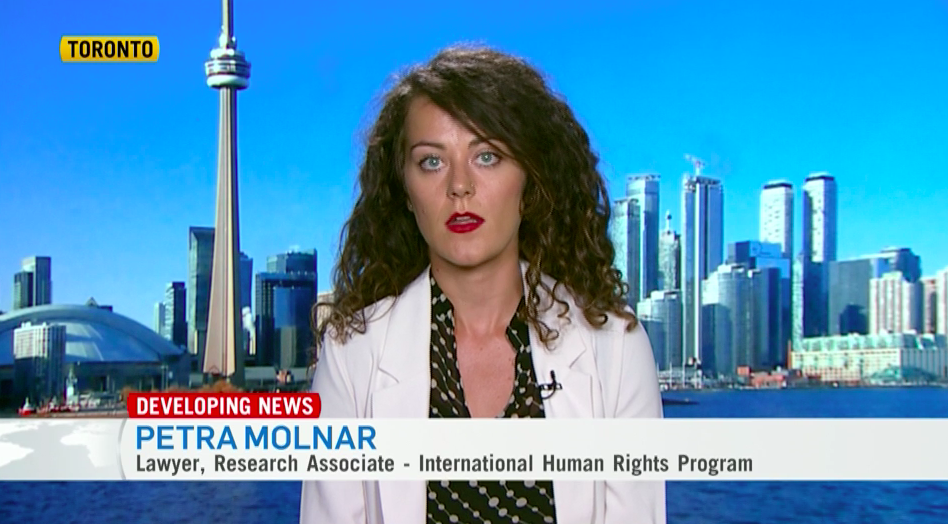
Petra Molnar on Trump's Immigration Policy and Child Separation
CTV News, June 19, 2018Television
URL: https://vimeo.com/276763820
Trump's recent "zero tolerance" policy has been ripping children away from their parents at the US-Mexico Border. Petra Molnar, lawyer at the International Human Rights Program, University of Toronto Faculty of Law, speaks to the human rights implications of these policies and the long term effects on migrant children and their families.
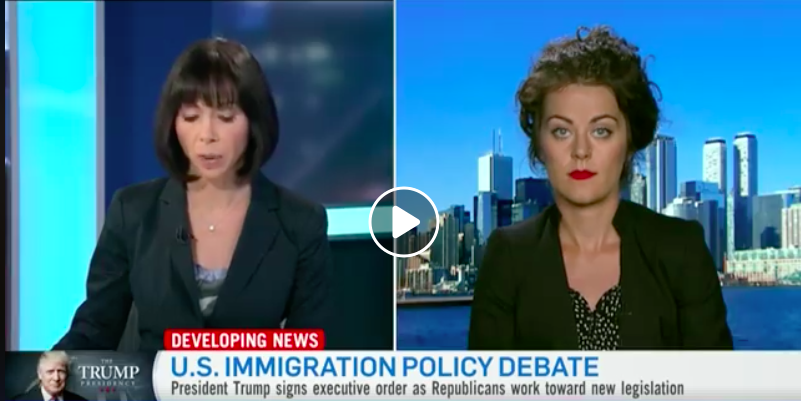
Petra Molnar on Trump's Executive Orders and Family Reunification
CTV News, June 21, 2018Television
URL: https://vimeo.com/276763312
Now that the White House has officially ended its family separation policy, critics of the system are urging reunification of children with their parents. But details on how, when, and if they can happen are scarce and murky. Petra Molnar, a lawyer and researcher with the International Human Rights Program at the University of Toronto, has more.
CBC, November 16, 2018Radio/Podcast
The human rights impacts of new technologies in Canada's immigration system with Petra Molnar, lawyer and co-author of "Bots at the Gate: A Human Rights Analysis of Automated Decision Making in Canada’s Immigration and Refugee System"
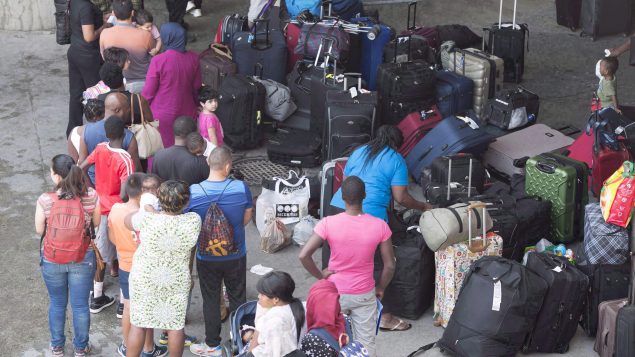
World Refugee Day - What does it all mean? (Syndicated radio)
Radio Canada International (Syndicated), June 20, 2018Radio/Podcast
URL: http://www.rcinet.ca/en/2018/06/21/refugees-millions-increasing/
On World Refugee Day 2018, Petra Molnar, lawyer at the International Human Rights Program, University of Toronto, speaks about the global refugee crisis, Canada's role, and what we can expect going forward.

Rainbow Refuge: LGBTQ Refugees in Canada
Beyond the Headlines, November 8, 2017Radio/Podcast
URL: https://beyondtheheadlines.net/2017/11/08/rainbow-refuge-lgbtq-refugees-in-canada/
Rainbow Refuge: LGBTQ Refugees in Canada
Posted on November 8, 2017
Podcasts, Shows
Canada, immigration, LGBTQ, refugee
Comments: 0
Screen Shot 2017-11-07 at 11.14.58 PM Audio Player
00:00
00:00
Use Up/Down Arrow keys to increase or decrease volume.
The significant growth in LGBTQ rights organizations around the world has led to advances in LGBTQ rights and calls for further changes. However, there has also been increase in systemic discrimination and violence against LGBTQ populations in certain regions around the world. It is illegal to be gay in over 75 countries around the world, and in 5 countries being gay can even be punishable by death. In many of these countries, policies and laws reflect how the state conveys their perception of sexual and gender non-conformers. Often times LGBTQ communities are framed in a criminal lense, which is a contributing factor to fostering public stigma and prejudice against LGBTQ people. Increases in violence, negative stereotypes, and criminalization of the LGBTQ populations are forcing them to seek safe haven in other parts of the world, including Canada. So, how is Canada rising to these challenges? Why have Canadian policies allowed Canada to become a primary destination for individuals who make refugee claims on the basis of sexual orientation persecution?
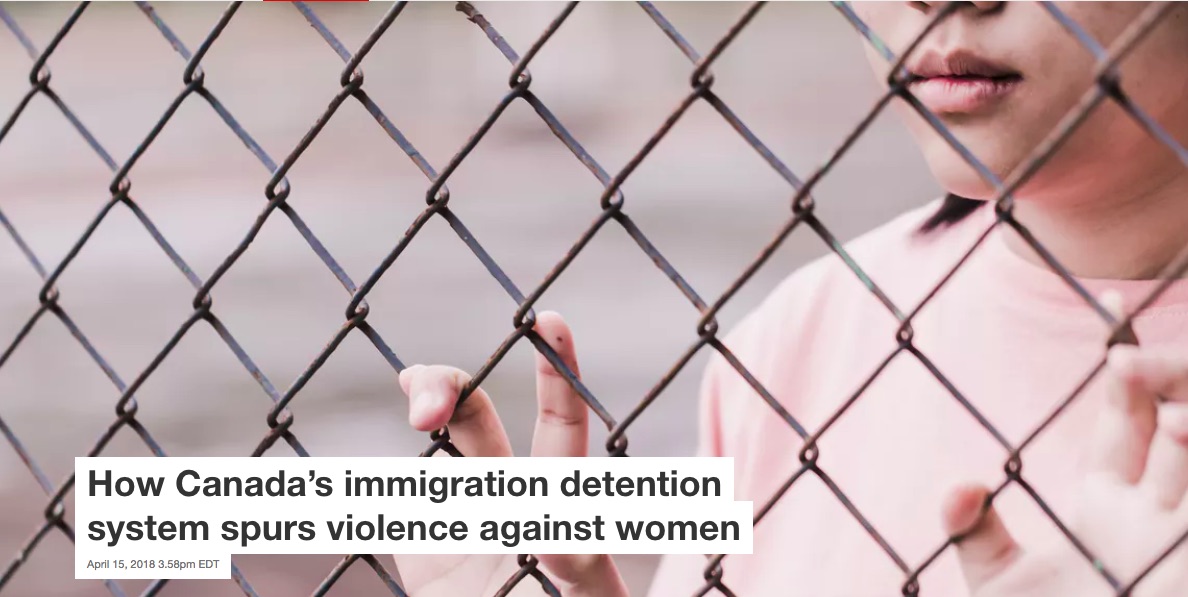
How Canada’s immigration detention system spurs violence against women
The Conversation, April 15, 2018Print
The Canadian immigration detention regime is rife with violence, distress and despair and it often spurs violence against women before, during and after incarceration. Our new project with FCJ Refugee Centre and other community partners challenges the false narratives about the benign impacts of Canadian detention on women, and delivers much-needed services to vulnerable women who are being unfairly left out of discussions on the negative health impacts of detention in Canada.
Sir Elton John funds probe into Canada’s treatment of refugees with HIV
The Toronto Star, January 8, 2015Print
The Elton John AIDS Foundation is funding a University of Toronto study into how recent changes to Canada’s refugee policies affect people who are living with or at risk of acquiring HIV. The $75,000 grant was announced this week by the singer’s long-time partner and now husband from Toronto, David Furnish. “These refugee claimants face a unique set of challenges and vulnerabilities when claiming asylum,” Petra Molnar said. “It is imperative that their experiences with resettlement and the asylum process are critically explored, so that appropriate policy and laws can be implemented.”
Does Canada Border Services Agency need oversight?
The Toronto Star, November 2, 2014Print
The Canada Border Services Agency is once more under fire for the way it handles arrests, detentions and deportations of refugee claimants and migrants. And critics of the agency are hoping a recent B.C. coroner’s inquest recommendations into the suicide of a Mexican migrant in Vancouver will finally bring results as they renew a call for some kind of independent civilian oversight of the actions of the CBSA and any complaints of wrongdoing. But for Petra Molnar of the Detention & Asylum Research Cluster of the Refugee Research Network , independent oversight is perhaps the only way to be able to lift the shroud of secrecy that surrounds CBSA and what she calls the lack of consistency in application of the law. Internal oversight or better management doesn’t cut it, she says.
"This work set my soul on fire," says U of T law grad
University of Toronto Bulletin, July 25, 2016Print
URL: https://www.utoronto.ca/news/u-t-research-takes-student-classroom-refugee-camps-turkey-jordan
When Petra Molnar graduated this year with a JD from U of T’s Faculty of Law, she carried with her invaluable experiences, such as conducting on-the-ground research on vulnerable Syrian populations in Turkey and Jordan. “The days were very, very long, but this work set my soul on fire,” she says of the two months spent speaking to asylum claimants, practitioners who were working with Syrian refugees, lawyers, doctors, academics, NGO and United Nations professionals. Many of the asylum claimants had very little access to health care but faced very big health problems, like amputations, burns, PTSD, and HIV. “The experiences in Jordan and Turkey made me see that this is the kind of work that I want to do in my life. There’s nothing like being in the field.”
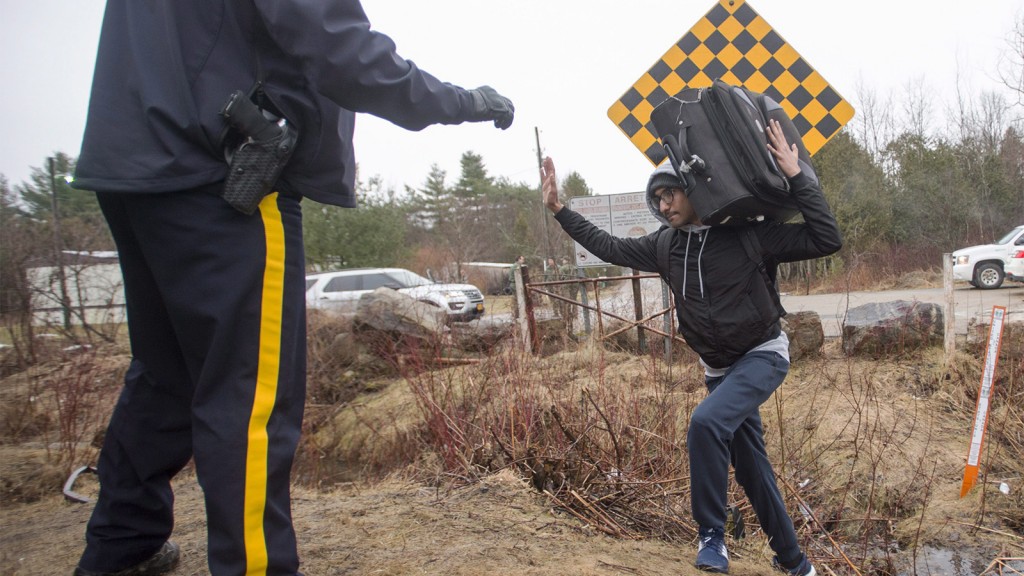
Migrants are dying in Canadian detention centres. The government needs to act.
Macleans, November 15, 2017Online
Since 2000, at least 16 people have died while incarcerated in Canada’s system of immigration detention, with a shocking four deaths since March 2016. The mounting death toll leads us to ask: Do certain deaths matter less than others? And for that matter, are some lives more imprisonable than others?
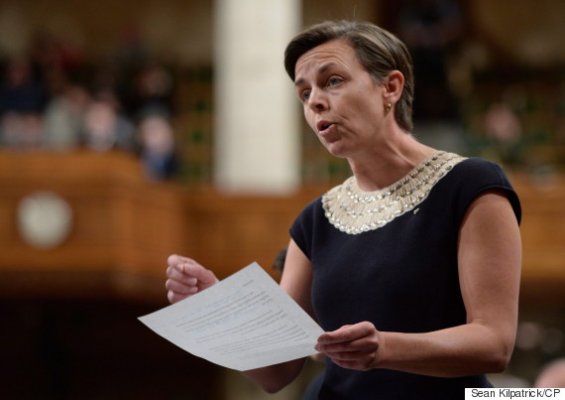
Trump's Rise Obligates Us To Question So-Called Canadian Values
Huffington Post, November 11, 2016Online
URL: http://www.huffingtonpost.ca/petra-molnar/canadian-values-kellie-leitch_b_12911956.html
Public discussion is powerfully shaped by the images and ideas projected by politicians and the media about borders, security and incoming "floods" of migrants. Public responses are grounded in the visceral fear that the old and golden way of life is over and that we now live in uncertain and dangerous times. In particular, the bodies of migrants carry the burden of our fears and they have become useful in bolstering increasingly violent migration management regimes across the world. Canada is by no means immune to these dangerous conflations and scare tactics. Hours after the announcement of the Trump presidency, conservative party leadership candidate Kelly Leitch stated that the victory sends an "exciting message" that is needed in Canada. This is the same candidate that continues to call for screening of immigrants for so-called Canadian values.
Research Findings from Immigration Detention: Arguments for Increasing Access to Justice
Canadian Association for the Study of Forced Migration (CARFMS), August 15, 2016Online
After decades of silence about the inner workings of immigration detention in Canada, 2016 has brought attention to the troubling incarceration of thousands of people for immigration-related reasons. Advocates for immigration detention reform have also been vocal about needing greater oversight for the Canadian Border Services Agency (CBSA) practices as well as a specific inquiry into the implementation of detention in Canada. While these public advocacy efforts are encouraging, our recent research documents a growing system of incarceration ensnaring more categories of non-citizens than ever before. Under international law, detention should be a measure of last resort. It should be non-punitive, non-arbitrary, and conducted with regard to due process, and must not sweep up asylum seekers or other vulnerable people. Unfortunately, this is not always the case in Canada.
Excluded from Justice? Immigration Detainees in Canada
CLAIHR - Canadian Lawyers for International Human Rights, April 4, 2016Online
URL: http://claihr.ca/2016/04/04/excluded-from-justice-immigration-detainees-in-canada/
The migrants' rights community was rocked by two recent deaths in the Toronto area two separate immigration detention facilities. These deaths have been shrouded in secrecy and few details have emerged other than brief biographical sketches of the deceased. What we have learned is that the first man was found unconscious and not breathing in his cell in the Toronto East Detention Centre after an apparent suicide. Guards at the Maplehurst Correctional Facility in Milton found the second man six days later in his cell with no vital signs. Both men were awaiting deportation from Canada. An official total of 14 detainees have died while in the custody of Canadian immigration officials since 2000. Our recent research into the Canadian detention system has found a growing system of incarceration ensnaring more categories of non-citizens than ever before. International human rights law stipulates that immigration detention is a measure of last resort that is non-punitive, non-arbitrary, conducted with regard to due process, and must not sweep up asylum seekers or other vulnerable people. However, although immigration detainees in Canada are entitled to monthly reviews of the reasons for their detentions, there is no express outer time limit, and rights to habeas corpus are extremely limited.

"Our Tour of Shame"
The Huffington Post, October 6, 2015Online
URL: http://www.huffingtonpost.ca/maia-rose-rotman/syria-refugee-crisis_b_8245778.html
Op-Ed: "Where is Canada?" In Turkey and Jordan recently, this was the question we heard over and over, from Syrian refugees themselves, crisis intervention workers, medical professionals, human rights activists and others dedicated to helping Syrians.
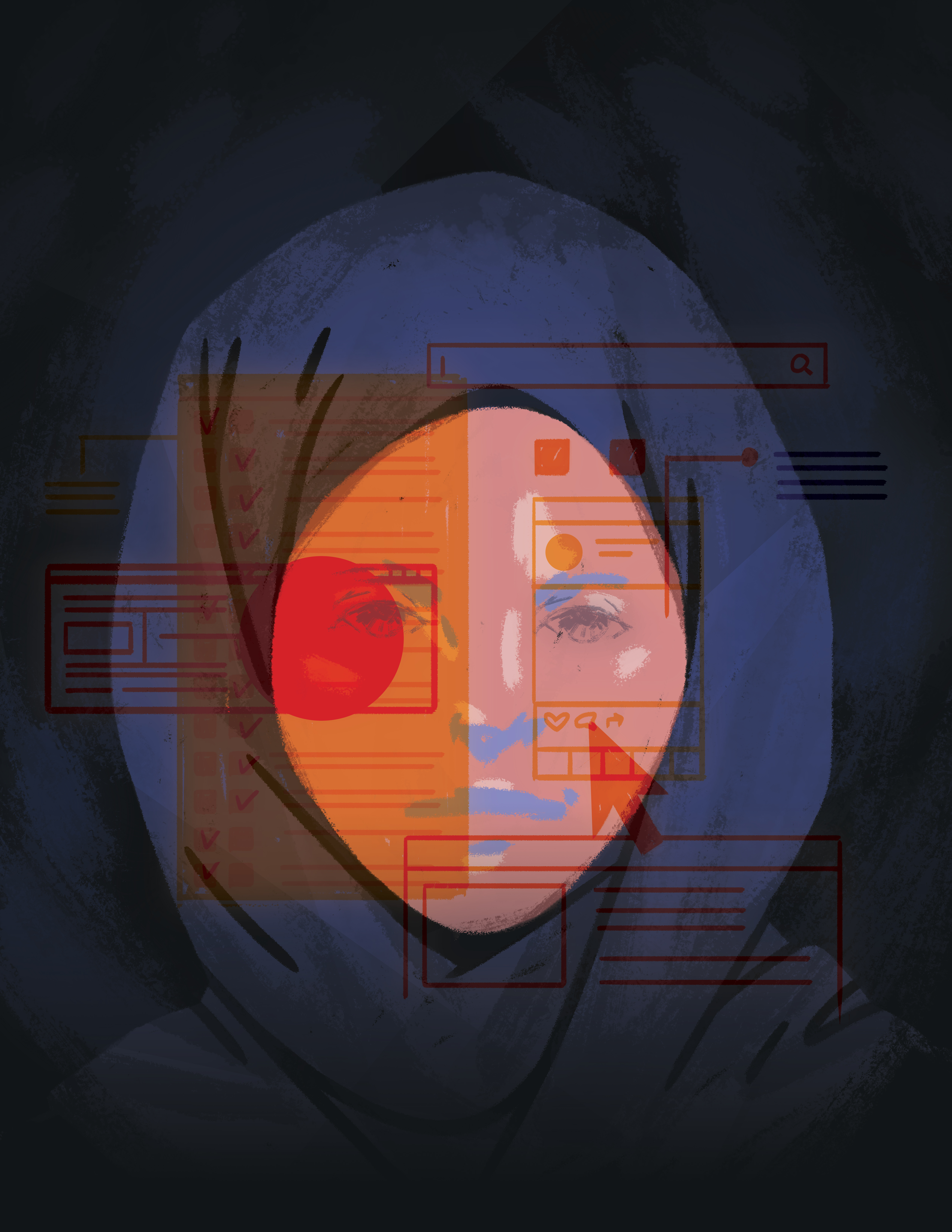
Bots at the Gate: A Human Rights Analysis of Automated Decision Making in Canada’s Immigration and Refugee System
by Petra Molnar and Lex Gill
International Human Rights Program and the Citizen Lab
September 28, 2018
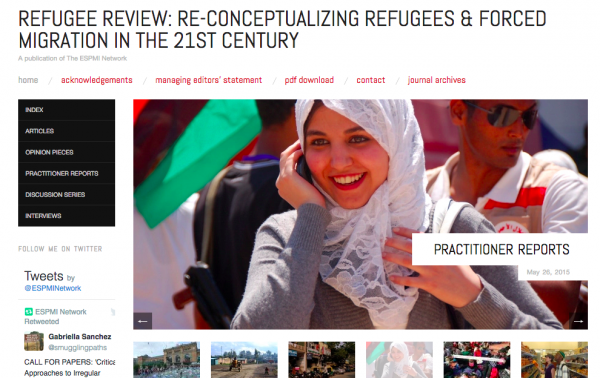
Refugee Review: Reconceptualizing Refugees and Forced Migration in the 21st Century
by Petra Molnar, Brittany Wheeler, et al.
ESPMI Network - Refugee Research Network
Welcome to the second volume of Refugee Review, the open access, multidisciplinary, multimedia, and peer-reviewed journal of the ESPMI Network. We are delighted to be able to share with you another rich edition of varied and challenging articles, opinion pieces, practitioner reports, discussions, and interviews from emerging scholars and practitioners around the world.
The purpose of this research study is to identify how various actors in the asylum and refugee system use information and communication technologies (ICTs). In a globalized world where communications increasingly take place over smarthphones, internet, and social media, how are ICTs best used by refugees when seeking asylum in Canada, as well as by refugee serving organizations (RSOs) that provide services to asylum seekers? This paper is part of an international study commissioned by SINGA Fran
The ESPMI Network connects emerging scholars, practitioners, policymakers, journalists, artists, and all those involved in the study and work related to forced migration though meaningful work, professional connections, and opportunities to publish and access research. ESPMI is a cluster of the Refugee Research Network (RRN), the largest international research initiative in the field of refugee and forced migration studies.
Discretion to Deport: Intersections between Health and Detention of Syrian Refugees in Jordan
by Petra Molnar
Published by Refuge: Canada's Journal on Refugees
November 7, 2017
Detention and deportation of migrants is a clear performance
of state sovereignty that relies on discretionary practices
and policies. The ongoing conflict in Syria highlights
the strain and social disruption in neighbouring countries
that host the majority of the world’s Syrian refugees. This
article looks at Jordan’s policies to detain and deport Syrian
refugees. Documented reasons for detention and deportations
include work permit infractions, including the deportation
of Syrian doctors and medical practitioners, as well
as deportations for communicable diseases. Detention
and deportation policies in Jordan are highly discretionary,
making interventions and advocacy on behalf of those
detained difficult. Detention and deportation can also have
disproportionate impact on populations that are already
marginalized, including members of the LGBTI community,
survivors of sexual and gender-based violence, and those
engaged in sex work.
URL: https://refuge.journals.yorku.ca/index.php/refuge/article/view/40401/36454
Unshackled Discretion – Barriers to Procedural Justice in the Canadian Immigration Detention System
Published by The Refugee Research Network
April 17, 2015
This paper was cited by Amnesty International in Canada's Period Review at the United Nations - July 2015. The growing Canadian immigration detention system spanning immigration holding centres, provincial prisons, short-term holding facilities, and a variety of other sites, touches upon the lives of thousands of people daily. This report examines a number of significant barriers to procedural justice for immigrants and asylum seekers detained in Canada. The report finds that the structure and realization of the Canadian detention system impede fair, unprejudiced, and non-arbitrary treatment for minorities and vulnerable people. Above and beyond the basic deprivation of liberty and setback to immigrants and asylum seekers’ interests, detention inflicts irreparable psychological, physical, and social damage. The report outlines significant issues such as deteriorating daily detention conditions, far-flung facilities locations, unfair discretionary decisionmaking, a lack of options for women, children, and vulnerable people, the compounding reasons for indefinite detention, inadequate legal aid and access to counsel, and additional barriers to justice. It concludes by discussing how the Canadian system is costly and ineffective, and often in contravention of national and international standards on immigration detention.
URL: http://refugeeresearch.net/ms/detention/publications/original-works/
The “Bogus” Refugee: Roma Asylum Claimants and Discourses of Fraud in Canada’s Bill C-31
Published by Refuge Journal
May 5, 2014
The passage of Bill C-31 into Canadian law in June 2012 is part of a discourse created around refugees by the current Government of Canada. Refugees are divided into “good and proper” refugees who live in camps abroad, and the “ fraudulent and bogus” refugees who claim asylum at the Canadian border. The new act, Bill C-31 or Protecting Canada’s Immigration System Act, is analyzed with respect to changes that will result in the systematic exclusion of certain groups of asylum seekers from Canada, based on these discourses of “bogus” and “fraud,” even though these groups may include genuine refugees. Drawing on the case of Czech Roma refugee claimants who come to Canada from Europe, this article shows how the Roma come to stand for the perfect “bogus” refugee — a person who wants to cheat the benevolent Canadian system without having grounds for a successful refugee status application.
URL: http://refuge.journals.yorku.ca/index.php/refuge/article/view/38604
The Boy On The Beach: The Fragility Of Canada's Discourses On The Syrian Refugee 'Crisis'
Published by Contention: The Multidisciplinary Journal of Social Protest
October 23, 2016
The contours of Canadian refugee policies have in recent years fluctuated from a narrative of 'bogus' refugees requiring a tough approach of interdiction to one of urgent humanitarian assistance. These rapid discursive shifts highlight the fragility of how Canada's humanitarian responses, and its place in the world, are conceptualized. Using the case study of Canada's responses to the Syrian conflict, this short paper argues that state responses must be critically interrogated in order to move away from homogenizing narratives grounded in tropes such as ‘fear’, ‘floods’ and ‘crisis’, which continue to impact how state, media, and public discourse handle the influx of refugees. Examining how the Canadian state performs its sovereignty in response to the Syrian conflict is instructive to reveal its broader nation-building projects, ones which utilize particular tropes of fear to justify suspicion and exclusion of bodies that have been cast as dangerous and uncontrollable. While Canada is once again presenting itself as a global leader in refugee and human rights issues, it remains to be seen whether these more humane policies can withstand the continuing millennial border anxieties of the West when facing the prospect of resettling increasingly large numbers of refugees.
URL: http://contentionjournal.org/wp-content/uploads/2016/10/Molnar.pdf
Refugee Review: Reconceptualizing Refugees and Forced Migration in the 21st Century
Published by ESPMI Network
June 1, 2015
Welcome to the second volume of Refugee Review, the open access, multidisciplinary, multimedia, and peer-reviewed journal of the ESPMI Network. We are delighted to be able to share with you another rich edition of varied and challenging articles, opinion pieces, practitioner reports, discussions, and interviews from emerging scholars and practitioners around the world. The sealing of borders, tightening of security measures, and perhaps most troublingly, the perpetuation of rigid categories of refugee protection, exacerbate the many abuses perpetrated against migrants today, and lend little to solutions that might bring forward resolution for all parties. Rigid categories of asylum obfuscate the nuanced experiences and motivations of migrants and static categories—refugee, economic migrant, asylum seeker, smuggler, and irregular migrant—cloud the diversification of push and pull factors of migration. The needs for protection continue to be complex, and they often fall outside of established categories in international instruments and jurisprudence used to determine who can and cannot access rights inherent to being designated a refugee. In an era of increasing environmental migration, extraterritorialization, and the ever-pressing need for durable solutions all across the globe, categories and policies that concretize migrants into problematic hierarchies of protection and exclusion must be re-conceptualized.We are incredibly proud to have worked directly with more than forty emerging scholars and practitioners to bring the second edition of our journal forward.
URL: https://refugeereview2.wordpress.com/introduction-from-the-editors/
Refugee Review: Social Movements
Published by ESPMI Network
July 1, 2013
We welcome readers to the e-publication of the New Scholars Network's inaugural issue of the Refugee Review. This open-source, peer-reviewed journal, based at no particular institution and tied to no particular location, is the product of collaboration between a growing and global group of new scholars, practitioners, policymakers and activists in the field of forced migration and refugee studies.
Refugees
Published by Historica Canada: Canadian Encyclopedia
March 17, 2016
Refugees and asylum seekers flee their countries in hopes of safety abroad. Governed by the 1951 UN Refugee Convention, refugee status is a matter of both international and domestic law. Historically, Canada has assisted many refugees from all over the world. However, human migration is a complex phenomenon, and Canada's refugee policies are also not immune to the influence of political and popular opinion.
URL: http://www.thecanadianencyclopedia.ca/en/article/refugees/
Refugees and ICTs
Published by SINGA
October 24, 2014
The purpose of this research study is to identify how various actors in the asylum and refugee system use information and communication technologies (ICTs). In a globalized world where communications increasingly take place over smarthphones, internet, and social media, how are ICTs best used by refugees when seeking asylum in Canada, as well as by refugee serving organizations (RSOs) that provide services to asylum seekers? This paper is part of an international study commissioned by SINGA France and portions of this research were presented at conferences in Montreal, Canada and Bogota, Colombia
URL: http://issuu.com/singafrance/docs/singa_international_study_2014_-_re/1
On Vulnerable Ground: Syrian Refugees At Risk of HIV in Turkey and Jordan – Recommendations for Canada’s Response
Published by International Human Rights Program, University of Toronto Faculty of Law
September 1, 2016
Internal report submitted to Canadian Ministry of Immigration and Foreign Affairs, based on a research project funded by the Elton John AIDS Foundation examining the negative impact of Canada’s refugee policies on refugees with HIV due to rampant violence, discrimination based on sexual orientation, and gender-based violence. This report is based on 50 first-person interviews with UN personnel, NGOs, refugee advocates, and refugees in Jordan, Turkey, and Canada.
Immigration Detention
Published by Historica Canada: Canadian Encyclopedia
August 17, 2016
Immigration detention falls under the framework of administrative law — the person being detained has not committed a crime under Canada's Criminal Code, but is being detained for immigration reasons.The detention of migrants was not a highly publicized issue in Canada until the deaths in the Vancouver and Toronto immigration facilities in 2013 and 2016 brought to light the conditions of thousands of people currently being detained. Immigration detainees are often isolated from community supports, and are unable to access doctors and lawyers. The prolonged periods of detention exacerbate existing mental health issues such as Post-Traumatic Stress Disorder (PTSD), which impacts many migrants coming to Canada from war-torn countries. Advocates argue that Canada's immigration detention system contravenes multiple instruments of international law, and that more oversight is necessary to prevent further deaths in the future and to reform the system as a whole.
URL: http://www.thecanadianencyclopedia.ca/en/article/immigration-detention/
Everyday Injustices: Barriers to Access to Justice for Immigration Detainees in Canada
Published by Refugee Survey Quarterly, Oxford University
March 1, 2016
The growing Canadian immigration detention system touches upon the lives of thousands of people daily. However, despite significant legal and normative problems, the Canadian detention system seems to be escaping sustained scrutiny. To address this gap, we employ the rubric of “access to justice” to refocus on inequalities being reproduced in the legal system that impede fair, unprejudiced, and non-arbitrary treatment for minorities and vulnerable people. If law is meant to govern equally and to ensure against arbitrary deprivations of liberty, immigration detainees should not be placed outside its reaches. Yet, our examination of access to justice in the Canadian detention system demonstrates that exactly this sort of displacement is occurring. Above and beyond the basic deprivation of liberty and setback to immigrants and asylum-seekers’ interests, detention inflicts irreparable psychological, physical, and social damage. We point to issues such as deteriorating daily detention conditions, far-flung facilities locations, unfair discretionary decision-making, lack of options for women, children, and vulnerable people, the compounding reasons for indefinite detention, and inadequate legal aid and access to counsel. Canada is propagating an extremely costly and ineffective system of administrative detention that is often in contravention of national and international standards on immigration detention.
URL: https://rsq.oxfordjournals.org/content/35/1/109.abstract?sid=f63a252b-0d83-4628-bf93-147aaa9607ed
Biography
Petra Molnar is a Barrister and Solicitor in Toronto, specializing in refugee and human rights law. She has also worked as a refugee settlement worker, interpreter, and researcher in Canada and internationally since 2008. She regularly share her work at conferences and writes about human rights and technology, immigration detention, and the politics of refugee, immigration, and international human rights law.
Recognition/Reconnaissance
University of Oxford Bob Johnson Graduate Scholarship | Professional
Awarded by the Faculty of International Development at the Refugee Studies Centre, University of Oxford
Ting Sum Tang Memorial Prize in Canadian or International Human Rights Law | Professional
Ting Sum Tang Memorial Prize in Canadian or International Human Rights Law to be awarded to the student taking the highest place in a course relating to Canadian or International Human Rights Law
John Yaremko Award in Human Rights | Professional
John Yaremko Award in Human Rights to be awarded to an outstanding student in any year who, in the opinion of the faculty, merits special recognition for academic achievement in the area of human rights
Additional Titles and Affiliations
Canadian Association for the Study of Forced Migration - Communications Officer, Executive Committee
Refugee Research Network - Asylum and Detention Research Cluster
ESPMI Network Advisory Committee
Barbra Schlifer Commemorative Clinic
Past Talks
Many “Moving” Parts: Rethinking Refugees, Relief, and Knowledge Production on Migration in the Middle East
16th Annual International Association for the Study of Forced Migration (IASFM) Conference
Poznan, Poland, July 12, 2016
Information and Communication Technologies and Refugee Resettlement: An International Comparative Approach
15th Annual International Association for the Study of Forced Migration (IASFM) Conference
Bogota, Colombia, July 15, 2015
International Refugee Law and HIV/AIDS
Law In Action Within School Invited Lecturer
Toronto, Canada, July 13, 2015
Health Rights, Security, and Stigma: Syrian Refugees in Turkey and Jordan
Invited Lecture
York University, September 22, 2015
Canada’s Response to the Global Refugee Crisis: Taking Stock and Moving Forward
CERIS and Factor-Iventash Faculty of Social Work Expert Panel
Toronto, Canada, December 3, 2016
Changes to Canada's Citizenship Act: A Primer
Toronto Tibetan Buddhist Association
Toronto Canada, June 17, 2015
Access to Justice in the Immigration Holding Centre: A Discussion of the Obstacles to Fair and Equal Treatment Facing Canadian Immigration Detainees
14th Annual Canadian Association For Refugee and Forced Migration Studies (CARFMS) Conference
Toronto, Ontario, May 13, 2015
"Multiculturalism and Barriers to Citizenship,"
Course: 208 Immigration Policy, Prof. Roohullah Shabon, Seneca College
Toronto, Canada, February 17, 2015
"None is Too Many": Geographic and Legislative Segregation of Roma Refugee Claimants"
Borders, Walls, and Securities Conference
UQAM, Montreal, Quebec, October 18, 2013
“Bogus Refugee: Bill C31 and the Discourses of Fraud in Canadian Immigration Policy”
14th Annual International Association for the Study of Forced Migration (IASFM) IASFM
Kolkata, India, January 6, 2013


